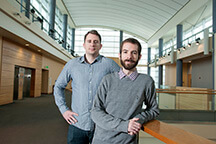Purdue Krannert students realize returns through startup venture fund
March 31, 2015
 |
|
Gary Travis, a Krannert MBA student, Thomas Grimes, a graduate student in the School of Nuclear Engineering, and eight other students participated in the Krannert School of Management's "Student Managed Venture Fund" course. The class challenges students to complete due diligence reports on startups applying for funding from the Emerging Innovations Fund, an evergreen fund created to accelerate the commercialization of Purdue's early-stage innovations. (Purdue Research Foundation photo) |
WEST LAFAYETTE, Ind. – Purdue University students are acquiring real-world business experience by performing due diligence on startups applying for funding from the Emerging Innovations Fund, an evergreen fund created to accelerate the commercialization of Purdue's early-stage innovations.
The Krannert School of Management's "Student Managed Venture Fund" course challenges students to complete reports on startups founded on Purdue innovations or based in the Purdue Research Park. The 10 students in a recently completed course executed due diligence on 12 startups seeking support from the Emerging Innovations Fund for the 2015 round of funding.
"I didn't know what to expect from the course, but I thought it sounded interesting, especially since I previously worked with Vibronix, another startup. My biggest takeaway was that I learned what it is like to study a company from the perspective of an investor or venture capitalist, and that experience was invaluable," said Gary Travis, a Krannert MBA student and Nelson County, Virginia, native who helps teach the capstone course for Purdue's Certificate in Entrepreneurship and Innovation program. "The process also demonstrated to me all the different criteria that an entrepreneur needs to consider. Then our team compiled the information and wrote a 30-page report and presented that report before a committee."
The reports filed by Travis and other students in the class included a research profile of each startup that demonstrates an understanding of the feasibility of the startup's product or service, budget, IP protection, licensing options, marketing targets, competitor analysis and financial projections.
"This course gives students opportunities for real-world experiences that integrate what they have learned in the classroom such as management concepts and principles with actual commercialization activities," said Richard Cosier, the Leeds Professor and dean emeritus of the Krannert School of Management. "It's an effective program. Over the past four years, more than $800,000 from the Emerging Innovations Fund has been invested in startups reviewed by students in the Student Managed Venture Fund course."
Companies that previously received funding from the Emerging Innovations Fund include bioVidria Inc., Matrix-Bio Inc., Medtric LLC, Microfluidic Innovations, Spensa Technologies Inc., Telos Discovery Systems and Tymora Analytical Operations LLC.
The course is supported through a partnership among the Krannert School of Management, Burton D. Morgan Center for Entrepreneurship and the Purdue Research Foundation.
"Determining what companies will receive support through the Emerging Innovations Fund involves several qualifying factors including product development, market feasibility, company leadership and funding potential," said Jon Gortat, a Krannert alumnus and Purdue Research Foundation Office of Technology Commercialization senior project manager. "Having Purdue students complete due diligence on startups not only provides them with an experiential learning opportunity, but they perform a real service for the startups as well."
Travis and one of his team members, Thomas Grimes, executed due diligence on SensorHound, a startup that is commercializing software to protect the "Internet of Things." This technology could reduce the development and operational costs for large networked sensor systems such as smart grids.
"I learned so much. SensorHound's target customers represent a large, competitive market because their technology addresses the needs of several different industries. I was impressed with the company's depth of knowledge right down to code writing," said Grimes, a graduate student in the School of Nuclear Engineering and a Fort Wayne, Indiana, native. "I am currently involved in Sagamore Adams, a company working in the field of nuclear engineering, and what I learned in this course has greatly increased my understanding of that company as well.
Following the student's presentations and funding recommendations before the Emerging Innovations Fund Economic Advisory Board, SensorHound received $75,000 from the fund with a potential to receive an additional $75,000 if certain performance milestones are met. The company is based on research by co-founders Patrick Eugster, associate professor, and Vinai Sundaram, research associate, both in the Department of Computer Science; and Matthew Tan Creti, graduate student in the School of Electrical and Computer Engineering.
"The quality of the students who performed the due diligence for SensorHound made a strong impact on our company," Eugster said. "Going through the process not only helped us receive the current funding, but I believe it will help us secure additional funds to further advance our company."
Writers: Cynthia Sequin, 765-588-3450, casequin@prf.org
Chris Adam, 765-496-2296, cadam@purdue.edu
Sources: Richard Cosier, 765-494-4353, rcosier@purdue.edu
Jon Gortat, 765-588-3485, jdgortat@prf.org
Gary Travis, travisg@purdue.edu
Thomas Grimes, tfgrimes@purdue.edu
Patrick Eugster, p@sensorhound.com

